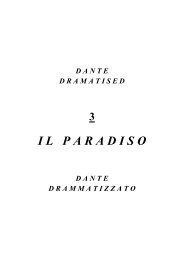You also want an ePaper? Increase the reach of your titles
YUMPU automatically turns print PDFs into web optimized ePapers that Google loves.
CHARACTERS BY PLACE: The Divine Comedy<br />
These tables may be used to characterise according to age, language/dialect (L’Inferno, Il Purgatorio, Il Paradiso)<br />
and dress (Il Paradiso, only).<br />
The dates of each character, often only known approximately, are given to establish his/her age and era. The age<br />
and appearance (but not the language/dialect) of characters impersonated by Muses are obviously irrelevant.<br />
The words of wordier characters are in the dramatisation itself.<br />
Greyed characters are best left speaking Dante’s Italian or standard English.<br />
In De vulgari eloquentia Dante looked for an eloquent vernacular among the dialects of Italy- with some reference<br />
to France and Provence – and recorded eloquent and non-eloquent contemporary expressions.<br />
Underlined expressions might be incorporated into the dramatisation. Mentions of dialect in the Divina Commedia<br />
itself (sipa for si, mo & issa) may also be used in the right places.<br />
MALE<br />
FEMALE<br />
DE VULGARI ELOQUENTIA (QUOTE OR PARAPHRASE)<br />
PLACE CHARACTERS<br />
ABRUZZO<br />
SULMONA<br />
formerly SULMO<br />
V<br />
-<br />
voice only<br />
no voice<br />
- OVID (43 BC – AD 17)<br />
Latin.<br />
APULIA Bolzerà che chiangesse lo quatraro<br />
I would like the boy to cry<br />
VENUSIA HORACE (65-8 BC)<br />
Latin.<br />
CAMPANIA<br />
CAPUA<br />
CASERTA PROV.<br />
I T A L Y<br />
V PIER DELLE VIGNE (1190-1249)<br />
Chancellor of the 2 Sicilies but born poor, so<br />
likely to have had a regional accent.<br />
NAPLES STATIUS (50-96)<br />
Latin.<br />
NAPLES<br />
CHARLES MARTEL D’ANJOU (1271-1295)<br />
or French?<br />
EMILIA-<br />
ROMAGNA<br />
There are 2 vernaculars. One (especially in<br />
Forlì) is so womanish, because of the softness of<br />
its vocabulary & pronunciation, that a man who<br />
speaks it…still ends up being mistaken for a<br />
woman.<br />
The other is shaggy…its brutal harshness would<br />
make you think any woman who speaks it a man.<br />
deuscì (God, yes) = yes<br />
oclo meo (my eye), corada mea (my heart) (to<br />
seduce someone)<br />
BERTINORO GUIDO DEL DUCA ( -1229+)<br />
of Onesti family of RAVENNA<br />
FIRST<br />
SEEN / HEARD<br />
INF C4 82<br />
-<br />
INF C4 82<br />
FIRST<br />
SEEN / HEARD<br />
17<br />
FIRST<br />
SEEN / HEARD<br />
INF C13 22 - -<br />
-<br />
PUR C21 13<br />
- - PAR C5 103<br />
PUR C14 4<br />
PUR C14 1<br />
- PUR C14 1 -<br />
-



